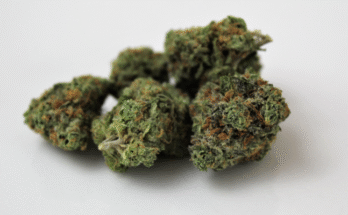Have you ever lost your train of thought after smoking a bunch of weed? Or how about being so high you completely forgot what you were talking about in the middle of a conversation?
It’s happened to me, plenty. And it can be a bit annoying, to be honest. Which is why I have scoured the internet and tested out a load of different ways to reduce the negative impact of cannabis on short-term memory.
But before I reveal this wisdom, let’s learn why cannabis has this effect on memory…
THC and memory
When you smoke weed (or vape/eat/dab it), THC makes its way into your bloodstream to be transported around the body. When it gets to the brain, it binds to and activates CB1 receptors, which are part of the endocannabinoid system.
Lots of these receptors are located in the hippocampus, amygdala, and cerebral cortex – areas of the brain that are vital for memory formation.
Put simply, it seems that THC disrupts neural signalling in the areas responsible for memory formation in the brain. This, in turn, causes short-term memory problems, which can have a negative impact on learning and concentration. This lasts for about two hours after inhaling weed, and longer if you eat it.

According to this study, while THC makes it difficult to consolidate short-term memories into long-term storage, there is no impairment in retrieving long-term memories. There is also some research that suggests frequent users become more or less tolerant to memory loss caused by THC.
Although there doesn’t seem to be any long-term consequences on short-term memory, there is evidence that lifetime cannabis use is associated with impaired verbal memory.
New study
In a recent study, published in Scientific Reports, researchers watched over Zoom as test subjects smoked weed or vaped concentrates, before giving them a series of cognitive and memory tests.
While the researchers found no impact on the users’ performance on decision-making tests in comparison to a sober control group, they did find some memory impairments related to free recall, source memory and false memories.
However, on a few memory tests there were no significant differences between the cannabis-using and sober groups, including prospective memory – the ability to remember to do things at a later time, such as attend an appointment.
The cannabis-using participants also did well on temporal order memory – the ability to remember the sequence of previous events.
One interesting finding was that the groups that smoked cannabis flower with both CBD and THC present did worse on verbal free recall trials, meaning they were unable to recall as many words or pictures that were shown to them compared to the sober group and the THC-only groups.
This finding is contrary to a small number of previous studies indicating CBD might have a protective effect on memory, which we’ll look at later.

Tips to reduce memory impairment
1. Nicotine
Of all the things I have tried in order to reduce the short-term memory impairment caused by THC, nicotine has by far been the most effective.
This kind of makes sense as nicotine is known to provide a powerful cognitive boost. In fact, nicotine is one of the most well-studied cognitive enhancers on the market. It’s been shown to reliably improve attention, concentration, learning and memory. It even shows promise at protecting against the early stages of Alzheimer’s disease.
And then there’s this study. It found that cannabis users had smaller total hippocampal volumes compared to cigarette-only and non-smokers.
However, while in most groups a smaller hippocampus was associated with worse memory scores, those who used nicotine as well as cannabis showed “a unique inversion, whereby smaller hippocampal volume was associated with better memory.” This suggests that nicotine increases connectivity in the brain despite a shrinking of the hippocampus.
In another study, one of the researchers summed it up like this: “Functional connectivity across multiple brain regions suffers when using nicotine or when using cannabis, but connectivity of those who use both substances together resembles that of nonusers.”
It’s suggested that nicotine’s cognition-enhancing effects may reduce the negative effects of cannabis on cognition, and that cannabis may potentially protect against the deleterious effects of nicotine.
There’s also this study that found while tobacco doesn’t improve the high from cannabis, it does protect against memory impairment caused by THC.
This is probably part of the reason why tobacco has such a long history of association with cannabis and why up to 70% of current cannabis consumers also consume nicotine.
If you’re put off by the proclaimed addictiveness of nicotine, fear not as nicotine on its own is actually a weak reinforcer. It’s the other ingredients in tobacco smoke that make nicotine so rewarding and potentially addictive.
So to avoid combusting tobacco, you could try some nicotine gum, a nicotine inhaler, or vape some nicotine e-liquid. I myself use additive-free tobacco alongside weed in my dry herb vape.
2. CBD
I’ve found CBD to be quite effective at protecting short-term memory caused by THC, but only up to a point. It’s great for small to medium doses, but if I smoke loads then the memory problems creep back in.
Similarly, while most studies done on the subject have found CBD offers some protection against THC-induced memory impairments, some show no effect.
One of the most recent studies, which I mentioned at the start of this article, found that adding CBD to THC did not offset impairments and in fact worsened verbal free recall (recalling words or pictures).

3. Terpenes
It turns out many terpenes – the aromatic plant compounds found in cannabis buds and other plants – actually play a role in preserving memory and concentration from the effects of THC.
The three that most stand out are pinene, limonene and beta-caryophyllene. Pinene, which is found in many plants as well as cannabis, has perhaps the most compelling evidence for counteracting short-term memory deficits induced by THC, although limonene and beta-caryophyllene also show promise.
Pine nuts, lemon juice and black pepper are useful additions to your sesh if memory preservation is important to you, or even if you need to sober up for whatever reason. Using essential oils may also help.
4. Ibuprofen
Recent research discovered that over-the-counter non-steroidal anti-inflammatory drug (NSAID) painkillers, such as ibuprofen, could possibly prevent cannabis-related memory loss.
While more research is needed to substantiate this claim, the study found that THC caused an increase in levels of an enzyme called cyclooxygenase-2 (COX-2) in the mouse hippocampus, a brain region involved in learning and memory.
Drugs or genetic techniques that reduced COX-2 levels in mice prevented memory problems and neuronal abnormalities caused by repeated THC exposure. Because COX-2 is inhibited by over-the-counter painkillers such as ibuprofen, the findings suggest it could be an easy strategy to prevent the memory problems inflicted by THC.
I don’t suggest using ibuprofen regularly, however, as it has been shown to disrupt the endocrine system and may negatively affect the reproductive system.
5. Low dose THC
THC is interesting. While large doses can disrupt short-term memory, smaller doses can actually improve it. This is known as a biphasic dose response.
The effect of improving memory is most pronounced in older animals who are given low doses of THC often. Moreover, recent studies demonstrate that THC paradoxically promotes hippocampal neurogenesis (formation of new brain cells), prevents neurodegenerative processes occurring in animal models of Alzheimer’s disease, protects from inflammation-induced cognitive damage, and restores memory and cognitive function in old mice.
I’ve written a bit about microdosing THC before and I think it’s a very useful tool for reaping the benefits of cannabis without the negative effects, such as memory impairment.
6. L-theanine/Green tea

L-Theanine has been shown to “powerfully block the development of both affective and cognitive abnormalities commonly associated with adolescent THC exposure”.
I haven’t tried it in supplement form, but did find a cup of green tea to be beneficial in reducing memory disruption when consumed alongside a big, fat joint.





My short-term memory is very bad because of frequent thc consumption for a long time, about 10 years. As a result, I just stopped worrying about this problem, because I thought that nothing could be done about it. Somewhere I heard that the method with cbd is even working, and that it specifically helps many people, do you think it is worth trying this method, will there be any positive consequences from this method?
It just doesn’t sound too convincing, because cbd is not far from thc in its affinity, which is why this method scares me. I will be glad to your answers!